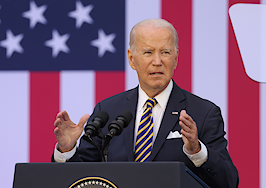This is the fourth story in a multipart series on real estate and the summer market. Check back tomorrow for more, and read the previous installments here, here and here.
After a long pandemic, Ryan Rodenbeck recently decided to get away from his home in Austin, Texas, and hit the beach. Rodenbeck — who owns Spyglass Realty — told Inman that he opted to head down to Port Aransas, an erstwhile pirate hangout on the Gulf of Mexico that in more recent years has attracted tourists. But when Rodenbeck arrived, he discovered multitudes of other people apparently had the same idea.

Ryan Rodenbeck
“We had to drive six miles down the beach to find a space to put our tent up,” he recalled.
Rodenbeck’s experienced suggests that there’s a shift happening right now: Americans appear to be getting more comfortable traveling shorter distances as the coronavirus pandemic appears to subside. And that has significant implications for the real estate industry because, especially when it comes to the summer, second homes and vacation rentals make up a major component of many markets.
So far this week, Inman has delved into the economics of the summer real estate market generally and found an overall sense of optimism among both economists and executives. However, vacation homes represent a unique subset of the broader market because they rely on travelers as well as conventional buyers and sellers. Moreover, vacation properties are often seen as discretionary, and require long-distance movement to access.
All of which means that the pandemic posed a unique challenge for vacation-oriented real estate, and betting that it would decline during the pandemic might have seemed like a logical move.
But in fact, just the opposite has happened.
Though experts who spoke with Inman said that consumer preferences have changed somewhat during the pandemic, overall the sector has come roaring back — to the point that it has even exceeded the expectations of some people who work in the industry. As the summer begins, in other words, consumers are flocking to vacation-oriented real estate, travelers are making bookings and management companies are struggling to hire new workers fast enough.
“Things are coming back,” Rodenbeck ultimately told Inman. “Big time.”

In the early days of the pandemic, travel mostly ground to a halt and vacation rental management giant Vacasa responded by laying off some employees and cutting the hours of others.
But Shaun Greer, Vacasa’s senior director of real estate, told Inman this week that more recently “travel has come back almost with a vengeance for us.”

Shaun Greer
“We are in a position where we are ramping up our operations as fast as we can,” Greer explained, adding that the company has hired back the majority of the people it furloughed.
Data the company provided bears this out: Vacasa’s booking window has fallen from a high point in April of 142 days prior to a stay to just 41 days in June. That’s just slightly longer than the average 35-day window the company saw through 2019.
More strikingly still, bookings in May were up 58 percent compared to January, which had previously been the company’s busiest month of 2020.
Greer said Vacasa is also currently seeing surging interest from real estate consumers who want to purchase secondary and vacation-oriented houses. Additionally, more existing owners are reaching out to Vacasa to explore potentially converting their properties to rentals.
Greer added that his company had hoped for the best and planned for the worst during the pandemic, but the actual reality at this point far exceeds anyone’s expectations.
“It’s much more busy, and there is much more demand, than we anticipated even in a best case scenario,” he said. “Our best case was to get back to our 2019 levels. This is well over our 2019 levels.”

Beachgoers on South Beach in Miami Beach, Florida, on June 10, 2020. Credit: Cliff Hawkins and Getty Images
There could be a few explanations for this resurgence. When it comes to travelers, Greer said, many people still want to get out, but can’t visit further flung destinations so they’re turning to nearby vacation destinations. Others might want a place where they can socially isolate during the pandemic and finally now feel comfortable traveling shorter distances.
Some of those factors may also explain a growing interest in buying vacation property.
“What we’re seeing is people wanting to buy second homes more because they want a place to get away and they want more privacy,” Greer said.
Vacation rental company Vrbo offered a similar take. In an email to Inman, a company spokesperson said that “travelers are gravitating toward vacation rentals because they offer ample space and privacy.”
Whatever the reasons, though, Rodenbeck experienced this trend first hand. In addition to running Austin’s Spyglass Realty, he also told Inman that he owns a duplex that he rents out to vacationers.
“When the virus hit, every single reservation canceled,” he said. “And now it’s completely booked. We had both sides of it booked every single weekend.”

While the vacation rental sector generally is coming back to life, not every destination is doing equally well. Greer said the most successful markets are located between two and two-and-a-half hours from major cities — or within driving distance.
“It’s been pretty clear to us that drive-to markets in any sort of economic impact are going to fare better than non drive-to markets,” he explained. “For this reason, drive-to markets are doing well.”
That specifically means that parts of the Gulf Coast have seen surging interest, and the West Coast is starting to become more popular as well. On the other hand, places such as Mexico and Hawaii have continued to suffer.
“People aren’t flying to Hawaii,” Greer said. “Those markets are down. Year-over-year, they’re down quite substantially. But the other markets, the drive-to markets, are up.”

People at a beach in Galveston, Texas, after it reopened on May . Credit: Callaghan O’Hare and Getty Images
Vacasa’s data further shows that guests traveled on average 27 percent less distance this May compared to May of last year. The company believes that fact illustrates travelers’ current preference for closer, drive-to destinations.
Vrbo has seen a similar trend. The company’s spokesperson told Inman that “there has been a 15 percent jump in demand for Vrbo vacation homes within 500 miles of home.” Moreover, 95 percent of Vrbo’s demand is for non-urban destinations.
Greer said Vacasa has seen a similar tilt away from major cities.
“What we see, high level, is the amount guests are paying is less in urban markets than it is in more vacation destination markets at this time,” he said. “That is somewhat of a shift.”

The pandemic isn’t just reshuffling the geography of vacation rentals, it’s also reprioritizing the features both owners and travelers are looking for.

Cara Ameer
Cara Ameer, a broker with Coldwell Banker who works in both Florida and California, told Inman that she too has seen a surge in interest among consumers who want vacation-oriented property. But she said people buying those units are realizing they’ll have to spend more time inside, so they want features like useable kitchens and comfortable entertaining spaces.
Significantly, she’s also seeing some would-be buyers give up on the prospect of making money with their second homes. The idea appears to be that with the relative instability of the travel market, some people are hunting for properties that they can afford even without generating rental income.
“It’s very much in demand,” she said of vacation property. “But not with the eye to ‘can I rent this out and can I make money?’ It’s more about having a place to go and having a place to gather.”
It’s hard to know how widespread such a trend might be, and Vacasa has reported seeing more interest among owners in rental income. What is clear from both accounts, though, is that preferences seem to be influx at the moment as the pandemic runs its course.
Either way though, the pandemic has shifted other preferences as well. Ameer said that many investors are looking for standalone and single family-style homes right now, and tend to be interested in having more space.
“Certainly single family properties are more in demand than any kind of attached living, even as a vacation property,” she said.
On that count, Vacasa agreed.
“What we’re seeing is more demand for what I’ll call single family,” Greer said.
“Not the condo or shared amenities. Anywhere you have shared amenities there’s less demand on the purchase side and the booking side.”
He added that consumers are currently showing a preference to properties with three or more bedrooms.

Consumers appear to be showing a preference for stand-alone vacation property during the pandemic. Credit: Sandra Seitamaa and Unsplash
This all makes intuitive sense given the isolation requirements of the pandemic. But it also represents something of a shift. In the past, many vacation destinations have built up their stock of apartments and condos, and those types of properties traditionally are cheaper and require less maintenance. That’s still the case, but during a pandemic those aspects are, apparently, no longer the biggest selling points.
Still, the takeaway right now appears to be that travel is coming back and with it an interest in travel-oriented real estate. And while the pandemic’s denouement is yet to come, Greer at least expects the current trends to hold steady for some time.
“I really think we’re in this another 12 months or so,” he said, “before people get comfortable getting on flights and traveling internationally.”













